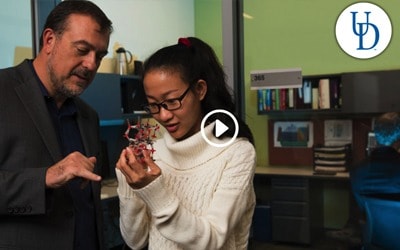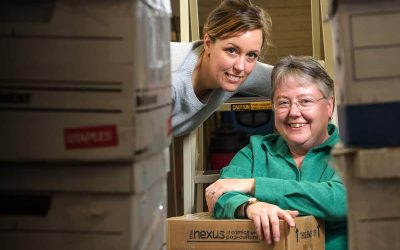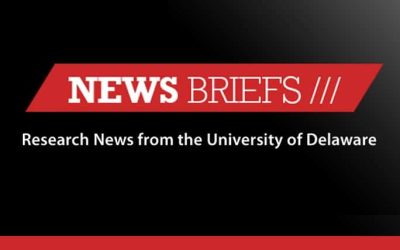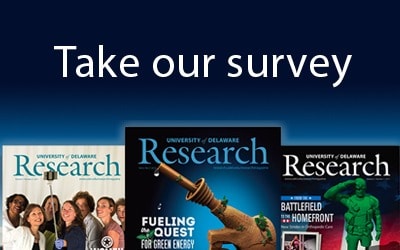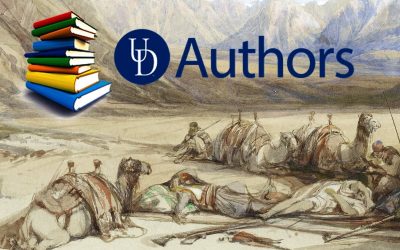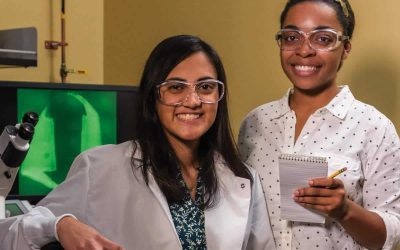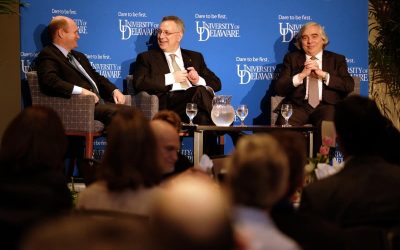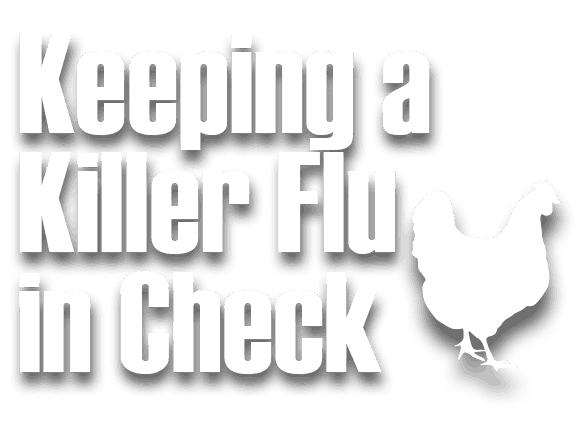
Q. Why did you pursue a career in avian science?
Q. What does the Avian Biosciences Center do?
A. Our mission is virtually the same as the nation’s Land Grant system, but with a focus on poultry and avian sciences. We teach and train undergraduate and graduate students, perform needed research, and transfer new knowledge generated through that work to support poultry production and the larger avian science community.
We also work closely with the USDA, the Department of Agriculture in both Delaware and Maryland, and the Delaware Department of Natural Resources and Environmental Control. Our UD Poultry Health System—the center’s disease diagnostic arm—is a member of USDA’s National Animal Health Laboratory Network, which specializes in surveillance for diseases such as avian influenza in poultry and wild birds.
Q. What’s the risk of avian flu in our region?
Q. How has the center responded to the bird flu crisis?
A. During the 2015 outbreak in Minnesota, Dan Hougentogler, one of our research associates, deployed to that state, and Dr. Eric Benson and instructor Bob Alphin provided expertise in depopulating infected poultry.
Locally, we provide vigilant surveillance and testing of flock health, training for industry and government workers, and laboratory research on vaccines. In 2004, our Lasher Laboratory in Georgetown was the first diagnostic facility in the U.S. to use a then-new research procedure called real-time reverse transcription polymerase chain reaction for the diagnosis of avian influenza in poultry. The rapid three-hour turnaround time versus the several days required of previous tests proved critical in limiting the outbreak to just three farms. Two years earlier, flocks in Virginia were devastated by a similar avian flu virus that resulted in the deaths of 4.75 million poultry.
Q. What kinds of advances has the center made?
A. Here are a few highlights to put our work in perspective: Our faculty have discovered many new poultry viruses, studied the diseases caused by the viruses, and developed vaccines to control them, benefitting farmers, production companies and consumers locally and throughout the world. Dr. Brian Ladman and I recently received a new grant from USDA to evaluate vaccines for the control of HPAI in chickens.
Additionally, our scientists developed the foam-based technology used for humane emergency poultry depopulation in avian flu outbreaks.This USDA- approved technology is widely used in the U.S.
We also help other labs improve their capabilities to respond to disease outbreaks through such programs as our USDA-supported emergency poultry disease certificate course, which has trained participants from 64 countries, and our new veterinary diagnostic laboratory quality assurance (VDLQA) certificate program, which begins this year.
Q. How do you approach an emergency bird flu situation?
A. Avian influenza outcomes, like those of cancer and other potentially fatal diseases, are time-dependent. Recognition at the earliest stage of the disease is critical. But unlike cancer, the situation with avian flu is more complex because the virus is highly contagious and it will multiply to enormous concentrations in poultry and spread via the air and by off-farm movement of infected poultry. Flocks infected with the highly pathogenic virus that occurred in the Midwest last year will die at very high rates. All normal farm activities must cease immediately when avian flu strikes, and the farm and the region must be prepared to implement an emergency biosecurity plan.
Delaware is well prepared for avian flu. A major part of the emergency plan is surveillance testing of any flock suspected to have flu. Samples from the suspect flock and surrounding farms will be tested by our UD labs, and those found to be positive will be depopulated within 24 hours of detection. Emergency flock depopulation is an essential tool in disease management as it ends animal suffering and, importantly, stops the shedding of the virus into the environment.
Q. Where else has UD shared its avian science expertise?
Q. What do you do when you are not chasing down bird flu and other avian diseases?
MORE STORIES
Energy IQ
Put your Energy IQ to the test, and let’s see if you are an energy guru or a fossil fool.
Catalysis Center for Energy Innovation
Cool video highlights CCEI’s mission of turning cornstalks and wood chips into fuels, electricity and chemicals.
Scanlon papers now part of disaster resource collection
T. Joseph Scanlon, a respected journalism professor in Canada, had a long-time relationship with the University of Delaware’s Disaster Research Center, which is now the repository of his over 70,000-piece collection.
Honors
The UD community celebrates its first Gates Cambridge Scholar, two new fellows in the National Academy of Inventors, and the first woman to receive the Soil Science Society of America’s Kirkham Soil Physics Award.
News briefs
A humanoid robot joins the pediatric rehab team, a new UD study suggests online shopping may not be as “green” as we thought, a professor aims to improve student experiences in global health, and summer research all-stars take the field.
Research Magazine Survey
We value your opinion. To show you how much, we will award a $100 Barnes & Noble gift card to three people who complete our survey. To be entered in this random drawing, please complete the survey by Nov. 1, 2016.
UD Authors
In her award-winning book, historian Christine Heyrman explores how the first U.S. missionaries in the Middle East influenced a nation’s attitudes toward Islam.
What science writing can teach us
Journalist, author and UD’s Distinguished Writer in Residence Mark Bowden shares lessons he learned as a science writer and recent samples of his students’ work.
New Train Station Project on Track for STAR Campus
An upgraded transportation hub in Newark will bring new riders and serve as an anchor for UD’s 272-acre Science, Technology and Advanced Research (STAR) Campus.
A trusted partner when the world turns upside down
Decisions made in times of disaster can be the difference between life and death, restoration and ruin. UD’s Disaster Research Center offers field-tested methods to strengthen recovery efforts.
Ch-Ch-Ch-Changes…
With significant change all around us, Delaware’s leaders—including the University of Delaware—are working to turn adversity into new opportunity.
Fueling the quest for green energy
Turning cornstalks and wood chips into renewable energy and valuable chemicals isn’t easy, but it is a promising focus of research at the Catalysis Center for Energy Innovation.




